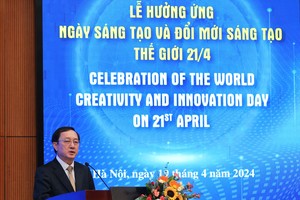
At the end of September 2022, FPT Semiconductor – a chip design and manufacturing company under FPT Software – launched its first line of microchip for Internet of Things products for the healthcare section. This integrated circuit line has been directly designed by FPT Semiconductor engineers and sold to its strategic partners for chip distribution in Australia and China.
“In the next 2 years, FPT Semiconductor is planning to sell 25 million chips worldwide, and introduce another 7 lines to serve the fields of telecoms, IoT, lighting equipment, smart devices, automobile technology, energy, electronics, and refrigeration”, said CEO Nguyen Vinh Quang of FPT Semiconductor.
On August 16, Prime Minister Pham Minh Chinh led a delegation to visit Viettel and received its proposal on launching a project for chip research, design, and manufacturing. Being a leading group to provide telecoms services, IT solutions, digital services, hi-tech production research, e-commerce and logistics, Viettel is fully capable of researching, designing, and producing chips to serve both domestic and foreign needs.
At the end of that month, Synopsys signed a memorandum of understanding with Saigon Hi-tech Park (SHTP) to support human resources training for integrated circuit design in Vietnam and to build a chip design center here. Accordingly, Synopsys will help SHTP to form a chip design center via the provision of software, curricula, teacher training. This cooperation means SHTP can take advantage of Synopsys’s technology to boost the development of the semiconductor industry in the country.
Obviously, this is a positive signal after a long silence period since 2013, when HCMC launched the program ‘Developing the IC Industry in the 2013-2020 Period’.
In 2017, HCMC approved yet another program named ‘Developing the IC Industry in the 2017-2020 Period, with a Vision to 2030’, in hope of restarting the activities in this industry. Sadly, since then, the human resources training for this field has still made no progress in promoting the development of the industry.
Chairman of the HCMC Semiconductor Industry Association Nguyen Anh Tuan commented that a semiconductor business cannot survive without an initial market. In addition, this industry requires extremely high infrastructure to serve research and design tasks, which is rather out of reach of most businesses or research institutes. This has made it absolutely challenging to boost the growth of the industry.
Until now, the country still does not own any true manufacturing plant, and it is particularly tough for Vietnam’s IC industry to compete against giants from developed nations like Intel, Qualcomm, Samsung, Sony, Toshiba, STMicroelectronics, NXP, MediaTek.
Therefore, it is wiser for the country to focus on the products which have a long life to meet the urgent needs of the society thanks to their high applicability.
























